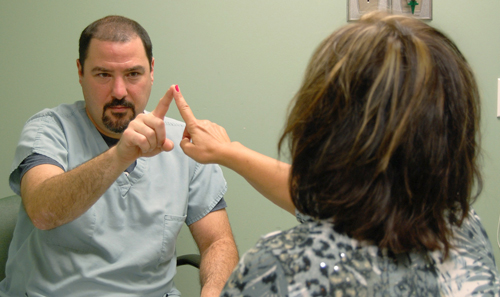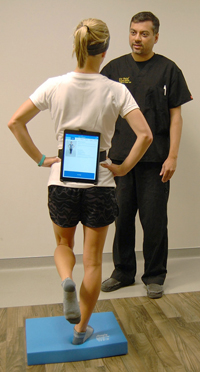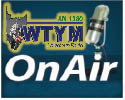Concussion Treatment Intensifies at Local Hospital

ACMH Emergency Physician Dr. Bryan Doner is one of two local physicians part of the hospital’s new Concussion Care unit to treat both athletes and other residents suffering from a possible brain injury. (submitted photo)
by Jonathan Weaver
From the Pittsburgh ice and fields to the Armstrong County backyard courts and roads, athletes and residents across the region suffer from brain injuries that could cause lingering symptoms and change lives.
But, with the introduction of Concussion Care at ACMH Hospital, doctors and staffers are now ready to treat patients of any age with possible concussions quickly.
Instead of directing patients of athletic injuries, vehicle accidents or traumatic falls to a Pittsburgh-based hospital, patients can now be seen at the East Franklin Township hospital’s Snyder Institute.
Outpatient Rehab Services Director Jeff Lasko said after working on the program about a year, physicians saw the first concussion patients in December.
“There has been a lot more news out there related to sports-specific concussion injuries, how they should be managed and looked at, so we just thought it would be nice to have that need close to home,” Lasko said.
A physical therapist, Lasko said he has treated several Armstrong and West Shamokin athletes for post-concussion symptoms, but recently most patients have been victims of vehicle accidents or falls that caused individuals to hit their head.
“(Concussions) are not an athletic thing necessarily – it can be any type of blow to the head or even a blow to the body that can cause a whiplash-type of injury. Movement to the head because the body sustained a blow,” Lasko said. “We’re looking to be able to manage people suffering from acute concussions or acute post-concussion symptoms.
“If the brain hasn’t recovered from the first (concussion) and you sustain a second (concussion), you can have more mental, physical, cognitive problems.”
So far, Co-Medical Directors Dr. Bryan Doner and Dr. Keyur Patel have evaluated concussion patients twice per week, but that service will be available more this Spring and Summer based on need.
Lasko has never formally been diagnosed with a concussion, but Dr. Doner suffered multiple concussions – both after playing Division III athletics at Denison University and after non-sports related incidents. His most recent concussion was about 15 years ago.
“I’ve probably had multiple concussions in my life, and I don’t think I ever really got any specific treatment for it,” Dr. Doner said. “It was always rest for a little while – things are a little different now.”

Dr. Keyur Patel (pictured) and Dr. Doner can utilize iPad technology to help measure concussion symptoms. (submitted)
Primarily an emergency physician, Dr. Doner said he sees concussions “all the time.” He estimated he rested less than athletes would be required to today and has seen athletes under-diagnosed with concussion symptoms.
According to the Armstrong School District’s concussion management policy from 2012, each year prior to students being involved with interscholastic athletics, noncompetitive cheerleading and practices and scrimmages, every student athlete and his/her parent/guardian has to sign and review an information sheet in regards to brain injuries.
“A student who, as determined by a game official, coach from the student’s team, certified athletic trainer, licensed physician, licensed physical therapist or other official designated by the District, exhibits signs or symptoms of a concussion or traumatic brain injury while participating in an athletic activity shall be removed by the coach from participation at that time,” the policy reads. “The coach shall not return a student to participation until the student is evaluated and cleared for return to participation in writing by an appropriate medical professional.”
A coach found in violation of the policy risks suspension for that season, the next season and permanently.
‘Heads Up Tackling’ was also instituted among Armstrong Youth Football teams to help alleviate fears of concussion symptoms with new helmets.
During past “Back 2 School Bash” activities in Ford City Park, Ford City Ambulance board of directors have purchased helmets for participating children to help them avoid injury.
Most patients recover from a concussion within two weeks.
“It often takes a long time to recover completely - the goal of that complete recovery is to prevent long-term symptoms,” Dr. Doner said.
Concussions could also cause normal symptoms, like migraines or depression, worse.
Dr. Doner’s five-and-three year old sons are also gearing up to play sports.
Dr Doner and Dr. Patel studied together at Lake Erie College of Osteopathic Medicine in 2008, completed their residency together at St. Vincent Health Center and a fellowship in in Hyperbaric and Wound Care Medicine.
The iPad-based C3 Logix program helps help measure balance, cognitive or visual symptoms.


